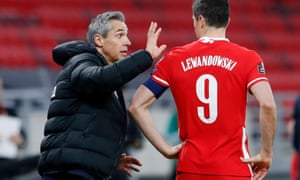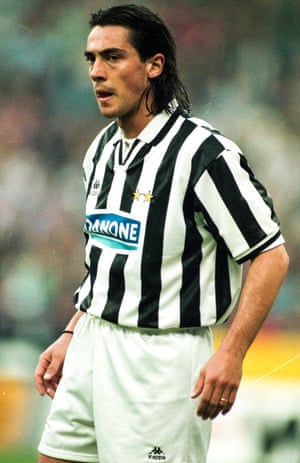Paulo Sousa accepted the Poland manager’s job towards the end of January. The Portuguese, a member of his country’s fabled golden generation as a player and whose itinerant coaching career has taken in Queens Park Rangers, Swansea and Leicester, travelled to Warsaw to meet his new bosses but not before making a significant diversion.
“Our first connection, of course, was with Robert Lewandowski, the captain,” Sousa says. “Before coming to Poland, we passed into Germany to see him, to get some impressions from him – how he sees the national team and the near future, what he wants to see around him. With all the coronavirus restrictions, we could not go out of Munich airport and so it was in the hotel of the airport.”
It was likened to a meeting with the pope and Sousa describes the four-hour summit as “fantastic”. He adds that Lewandowski, the Bayern Munich superstar, was “really enthusiastic, really participative”.
And yet the unusual thing about it, the detail that bears emphasising, is that the sit-down was in person. Before the start of the current international break, which will conclude with Wednesday night’s World Cup qualifying visit to Wembley – a game that Lewandowski will miss because of a knee injury he picked up in Sunday’s 3-0 home win over Andorra – Sousa’s actual contact with his new players was minimal.
“I saw seven live games in Italy, where some of our players play – only Italy allowed us to go there and see matches, and not all the matches,” Sousa says. “I met with the various players after those games. And I saw two more games in Poland.”
So nine matches in total plus a face-to-face with Lewandowski. That was the sum total of Sousa’s human interaction with his squad before he got them together for a first training session last Monday and there were only three of those before the opening qualifier against Hungary in Budapest last Thursday, which finished in a 3-3 draw.
Everything else has been done via digital platforms. The pandemic has enabled remote working to become a reality but Sousa’s case feels like one of the ultimate tests. He has never previously managed a national team, nor has he worked in Poland. Now, he has the top job in a football-obsessed nation of 38 million and he has put together the basis of a World Cup qualifying campaign via Zoom.
“We were really convinced about our work and everything that we decided but until you have the contact on the pitch on a daily basis, there is always a question mark,” Sousa says, with a smile.
Sousa’s first task with his staff was “to decide a universe of 45, 50 players and follow them systematically”, analysing footage of their games, judging how they might fit into his model or how he would have to adapt to them. He calls it “the moment we started to connect”, albeit in a virtual way, and then there were the Zooms.

The first session involved the whole “universe”, Sousa splitting it into two depending on whether the players had morning or afternoon training with their clubs and presenting himself to them. He is fluent in English, Spanish, French and Italian – plus his native Portuguese – but he does not speak Polish. No matter. English has been the lingua franca, with all of the players versed in it to varying degrees.
Sousa used a series of subsequent one-on-one calls to lay down general guidelines before greater specifics on a technical level, integrating new concepts, although not too many. The week before the squad met up, he “started to be a little more incisive in some images” he showed them.
There has been no escaping the weirdness of the situation, even if Sousa says that the players’ patriotism and openmindedness to his methods have helped, and it is easy to wonder why Zbigniew Boniek, the Polish Football Association president, chose to make the managerial change when he did.
The previous manager, Jerzy Brzeczek, had overseen qualification to the Euro 2020 finals but delve deeper and there were concerns about the performances, including among some players. When Lewandowski was asked after the 2-0 Nations League defeat to Italy last November what the plan had been, he ummed, ahhed and blew out his cheeks. It took him eight seconds to answer and the subtext was clear.
Boniek had loved Sousa’s Fiorentina team – the one that finished fifth in Serie A in 2015-16 – and he picked up the phone. “It was a direct call from him and it gave me much more of a positive instinct to take the job,” Sousa says. “Also because Zibi is someone from football; he’s an icon of football. He wanted to make a change and, from what I understand, several players wanted to have a new route. With a new idea of football.”

When Boniek made his play, Sousa says he thought straight away about Lewandowski, a striker he could only have dreamed of signing at his various clubs, which have also included Videoton, Maccabi Tel Aviv, Basel, Tianjin Quanjian and Bordeaux. Now he would be able to call him up, although not against England and there is no point in pretending the absence is not a hammer blow.
Sousa’s playing days took him to Champions League glory with Juventus in 1996 and Borussia Dortmund in 1997 and saw him rub shoulders with a Who’s Who of the game. “The best part of football is on the pitch – there, it’s always the truth,” Sousa says. “Behind that or out of that, it doesn’t look the same.”
So which players does he remember most fondly? “Technically, the best I played with was Roberto Baggio,” he says. “Against, it was Zinedine Zidane. We have Luís Figo and Rui Costa. And also, somebody that I have in my head and my heart all the time is Gianluca Vialli.”
Lewandowski belongs in the same company. “For me, football is mainly time and space and it’s amazing the space that Robert decides to occupy,” Sousa says. “And his timing. He will never be out. He scores goals in every different way. He is really complete.”
Sousa recognises that Poland’s greatest quality is to be found up front, mainly in Lewandowski but Napoli’s Arkadiusz Milik, on loan at Marseille, and Krzysztof Piatek of Hertha Berlin, too. That said, their goalkeepers are formidable. Brzeczek would rotate between Juventus’s Wojciech Szczesny and Lukasz Fabianski of West Ham. So far, Sousa has picked Szczesny.
“In Poland, the great players are the strikers – we need to feed them – and the expression they can have goes through the idea I always have which is to see my team dominate with the ball,” Sousa says. “[Players] who know how to give some pause and acceleration on the game but mainly to create opportunities from the wide and central corridors.”
England represent an early acid test. “The Premier League is the best league in the world and Gareth Southgate has one of the best national teams in the world,” Sousa says. “We need to take care with the spaces between the lines and to defend well the space behind our defensive line. It’s a deepness.”
from Football | The Guardian https://ift.tt/39tZ8hA
via IFTTT

No Comment